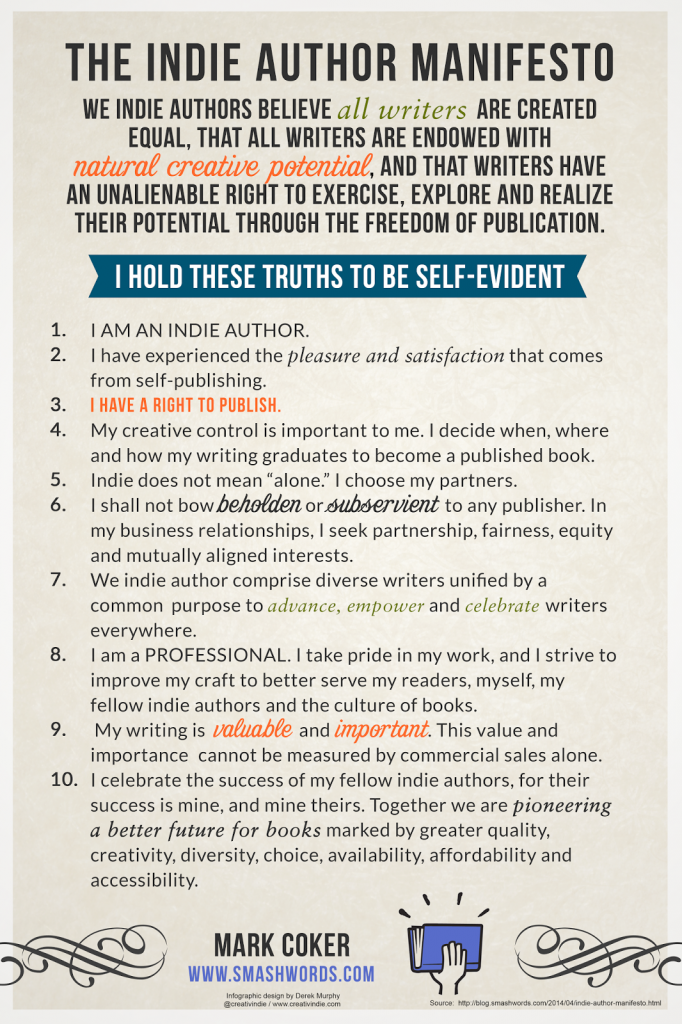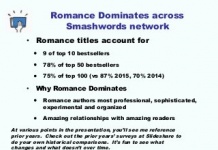
Yesterday’s roundup by Joanna had an interesting post from Smashwords’ Mark Coker. The site’s founder created an indie author manifesto, empowering and highlighting just how far the world of self-publishing has come.
Certainly, the freedom of publishing has allowed many more to find their voices and given them a bigger platform to be heard.
Some of the points from Coker’s manifesto include:
– I have experienced the pleasure and satisfaction that comes from self-publishing
– I have a right to publish
– My creative control is important to me. I decide when, where and how my writing graduates to become a published book.
The manifesto is interesting, but the reality is that indie authors are still here and still fighting. For as many success stories as there are, it seems someone else wants to shut them down and not give credence to their books.
We all know some books aren’t perfect. I review books for a site that only showcases indie books. Some of the books have not been good, full of mistakes and poor sentences. Yet, I have read some great books. I can say the same, however, about traditionally published books.
There is an important note in the manifesto:
– Indie does not mean “alone.” I choose my partners.
All writers could use help. This could mean help with cover design, formatting, editing, plot questions, character development, and more. There are a number of forums, Facebook groups, writing groups where authors help each other.
Coker has been a champion for indie authors for many years, and the manifesto is just another step in that direction.


































Oh, I don’t know. Some of the items on this list strike me as appealing a bit too much to those who are narcissistic or thin-skinned. That includes lines such as: “My work is valuable and important.”
If I wrote music, it’d be uniformly dreadful. The same is undoubtedly true of some self-published authors. Slate has an article about one of the best known of them here:
http://www.slate.com/articles/arts/culturebox/2013/01/was_amanda_mckittrick_ros_the_worst_novelist_in_history.html
Note these remarks:
—–
One thing that is clear about Ros’ prose is its aversion to calling a thing by its name. Eyes are “globes of glare.” When their owners are unhappy, these globes are “stuffed with sorrow.” Trousers are not trousers; they are “the southern necessary.” It’s as if, for Ros, circumlocution and literature are essentially synonymous. When a near-destitute Oscar is forced to take up work as a schoolteacher in America, he is quickly “compelled to resign through courting too great love for the all-powerful monster of mangled might”—by which she means, naturally, “Intemperance.” And then there’s this extraordinary sentence about the eponymous heroine of her second novel, Delina Delaney: “She tried hard to keep herself a stranger to her poor old father’s slight income by the use of the finest production of steel, whose blunt edge eyed the reely covering with marked greed, and offered its sharp dart to faultless fabrics of flaxen fineness.” (That is, Delina did some work as a seamstress so she wouldn’t have to live off her father.)
—–
Genuine professionalism has room for humility and humor. It doesn’t take itself too seriously or fret endlessly about critics. To that list, I’d add a suggestion to lighten up and get a life.
–Michael W. Perry
What Michael said. The manifesto would be enormously improved by adding the words ‘to me’ at the end of the first sentence in point 8.
Oops — I meant point 9.